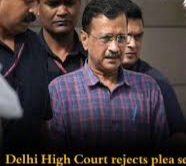In a recent legal development, the Delhi High Court has made a significant ruling regarding a petition seeking the removal of Arvind Kejriwal from the position of Chief Minister of Delhi.
The petition, filed by Vishnu Gupta, alleged misconduct and malpractice against Kejriwal, prompting a legal battle that has drawn attention to the intersection of law and governance in the Indian capital.
Court Proceedings:
During the court proceedings, the Delhi High Court addressed the jurisdictional limitations of intervening in executive matters.
The court, while acknowledging the serious allegations against Kejriwal, emphasized that such issues fall outside its purview.
In a nuanced examination of legal precedent, the court inquired about past instances where it had intervened to remove a Chief Minister through judicial orders, highlighting the complexity of the case.
Allegations Against Kejriwal:
The allegations against Kejriwal include claims of interference with policies regulating the sale of alcohol in Delhi and accusations of corruption related to the government's production tax.
These allegations have sparked controversy and raised questions about accountability and ethical governance in the capital.
Kejriwal's Legal Situation:
Kejriwal's legal woes have deepened with his recent imprisonment on charges of money laundering. Despite being behind bars, Kejriwal has expressed his determination to continue serving as Chief Minister and to govern from jail—a move unprecedented in Indian political history. This has sparked debate and speculation about the boundaries of executive authority and the role of law enforcement in ensuring accountability.
Legal Analysis:
Legal experts have weighed in on the case, emphasizing the need for legislative clarity on the removal of a Chief Minister under such circumstances.
The absence of specific legal provisions for addressing situations like Kejriwal's underscores the complexity of the legal and political landscape in Delhi.
Public Perception and Political Implications:
The ongoing legal battle and controversies surrounding Kejriwal's tenure have had a significant impact on public perception.
While some continue to support Kejriwal, others believe that his refusal to resign amid legal troubles diminishes public trust and undermines the principles of democratic governance.
As the legal proceedings continue, all eyes remain on Kejriwal's next steps and their implications for the future of Delhi's administration.
The case highlights the need for robust legal frameworks and ethical governance practices to ensure accountability and transparency in public office.










